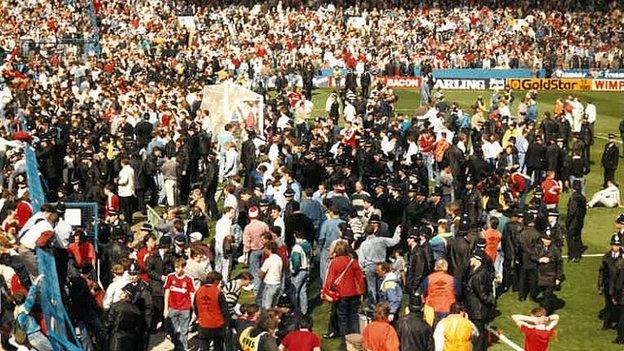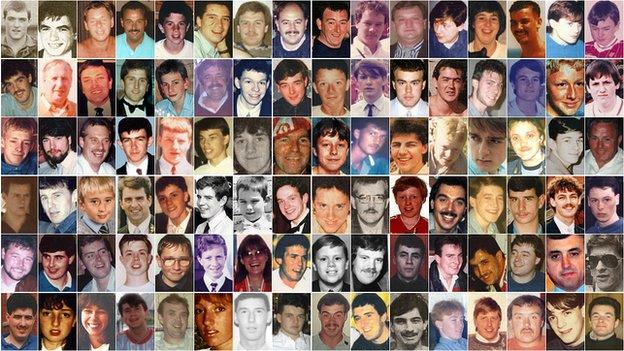Hillsborough Inquests: Commander said fans 'broke in'
- Published

Ninety six people died as a result of a crush at the FA Cup semi-final between Liverpool and Nottingham Forest on 15 April 1989
The match commander at Hillsborough told football chiefs Liverpool fans forced open a gate to "break in" to the ground, a court has heard.
Glen Kirton, who was the Football Association's press chief in 1989, said Ch Supt David Duckenfield made the remark inside the police control box.
At an earlier hearing, the jury heard an order was given by Mr Duckenfield to open an exit gate at 14:52 GMT.
Ninety six people died as a result of a crush at the Sheffield stadium.
Mr Kirton's witness statement, made in 1989, said: "Chief Superintendent Duckenfield told us the gate had been forced and an in-rush of Liverpool supporters had caused casualties".
Reports of fans breaking in were carried by the media until a press conference held on the evening of the disaster, the inquests heard.
The jury heard Peter Wright, South Yorkshire Police's chief constable, told journalists "a gate had been opened by police".
'Accurate information'
Mr Kirton told the Warrington inquests he went to the police control box with the FA chief executive Graham Kelly and Sheffield Wednesday's secretary Graham Mackrell as the disaster was unfolding.
Asked why they went to the control box, Mr Kirton said: "Because we thought that was the place where we could get the most accurate information about what was happening and also be able to ascertain whether the match was going to continue or not."
Mr Kirton said Mr Kerry and Mr Duckenfield had a conversation, with the match commander then pointing to the monitors and saying "there had been a break-in".
Under questioning from Mr Duckenfield's barrister, John Beggs QC, Mr Kirton accepted the police commander had not identified a specific gate.
Mr Kirton said it was not until the press conference that "it became apparent" a gate had not been forced, although he was earlier aware that some fans believed it had been opened by the police.
'Russian roulette'
The witness also spoke about a conversation with Mr Mackrell about the possibility of delaying the kick-off at about 14:40 GMT.
He said: "Graham said to me that there was a lot of people still to come in. My recollection was that the figure was around 20,000 people, which seemed a lot at that stage in the afternoon.
"I asked Graham whether, as there were many people still not inside the ground, the police were likely to ask for a delay to kick-off.
"He said that they did not like to do that because of the potential problems that caused at the end of the game with getting spectators away."
Jonathan Laidlaw QC, who represents the FA, asked him about a suggestion made by a former police inspector on duty at the match that the ground was a "death trap" and that the FA was playing "Russian roulette" with fans' lives.
Mr Kirton said he "can't think that there would be anybody" who would have regarded the stadium as a death trap and that he could see "no justification" for saying that the FA was risking the safety of supporters.
The inquests continue on Thursday.

Who were the 96 victims?

BBC News: Profiles of all those who died
